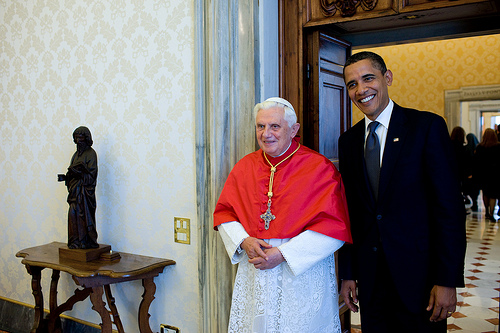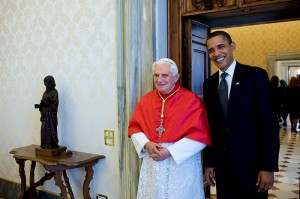
Promoting Religious Freedom: a Case for Ensuring National Security?
As the new pope for the world’s 1.5 billion Catholics was inaugurated yesterday, one cannot help but think, on a larger scale, of the impact of religion in international politics and foreign policy. Although secularism is on the rise in many parts of the globe, religion has shaped societies and is still an influential factor – to American discourse as well as international events that affect national security.
Pursuing an agenda towards religious freedom became an element of U.S. foreign policy officially in 1998, when President Clinton signed the International Religious Freedom Act (IRFA), which instituted the State Department’s Office of International Religious Freedom. They produce an annual study reporting on countries that infringe on religious liberties and promote projects to stimulate debate on the issue.
In spite of that, religious freedom as a foreign policy goal does not enjoy a prominent role – and at a time when terrorist groups with components of religious extremism, are the main enemies of the United States, it has become all the more controversial. Ignoring it, or threading ever so carefully in a way that does not actually produces results, won’t help matters.
As it is, 84% of the world’s population identifies with a religion, a fact that can hardly be ignored. For political leaders, ambassadors, and many of the populations the US aims to reach, religion is a pillar to their values. As Philip Seib points out in a recent article, this goes beyond matters of human rights and mutual understanding. The US should embrace religion on a broader scale in order for it to promote its interests and achieve its foreign policy goals.
Policies that concretely address that, however, would not be easy to implement: if they focused on one particular religion, Islam for instance, and ignored others such as Buddhism, that could give rise to cries of discrimination or reductionism. Although religious freedom is a critical part of America’s founding principles, pursuing such an agenda could also be perceived as hypocritical. On its website, the office of International Religious Freedom is quick to point out that “no country has a perfect record of religious freedom, including the United States, and we can all endeavor to reach a higher standard.”
But while it seems likely that the implementation of such a policy would not be without its missteps at the beginning, the subject should gain more attention within the national security agenda. Otherwise, the price may be steep for the government: there is a strong correlation between religious persecution and countries that become threats to the world and to American soil. As it is, the US’s greatest enemies at war severely violated religious freedom, from Nazi Germany to Saddam Hussein.
It makes sense that authoritarian governments would be repressive in the religious sphere as well, making it all the more relevant for the US to take the lead and champion religious freedom. Cultural and public diplomacy programs could serve to bridge gaps and allow room for debate on the issue.
Without a doubt, religion has greatly influenced recent international events – especially as non-state actors become stronger and more prominent. It has also been at the core of some of the most violent events and wars in history, and governments shouldn’t ignore it to avoid possible controversy. Yet there are also areas in which promoting religious freedom can run contrary to other issues, such as the rights of women, and America must strive to not become involved in debates about the interpretation of religion. The U.S. must therefore be deliberate, but cautious and measured in its statements and actions — combating religious persecution in a way that aligns not only with American ideals but with the need to promote democratic values across nations without imposing them.







